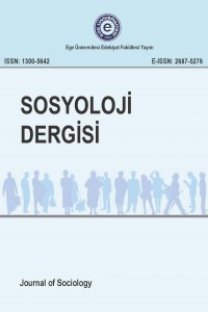SAĞLIĞIN VE HASTALIĞIN ANLAMI: FARKLI SOSYO-EKONOMIK STATÜ GRUPLARININ ALGILARI
The Meaning of Health and Illness: Perceptions of Different Socio- Economic Status Groups
Health, illness, sociology of health, socio-economic status groups Eskişehir,
___
BLAXTER, M., 1983, “The Causes of Disease: Women Talking” Social Science and Medicine, 17 (2): 59-69.BLAXTER, M., 2004, Health. London: Polity Press.
BORUCHOVITCH, E. and MEDNICK, B.R., 2002, “The Meaning of Health and Illness: Some Considerations for Health Psychology” Psico-USF 7 (2): 175
CALNAN, M., 1987, Health and illness: The Lay Perspective. New York:
Tavistock Publications. CHEN, Y., 2003, “The Meaning of Health and Health Promotion Practices of
Taiwanese Elders With Chronic Illness” Home Health Care Management & Practice. 15(6): 505-510. CİRHİNLİOĞLU, Z., 2003, "Post-Modern Çözülüş ve Sağlık", Kocatepe
Üniversitesi Sosyal Bilimler Dergisi, 5: 131-148. CORNWELL, J., 1984, Hard-Earned Lives: Accounts of Health and Illness from
East London. London: Tavistock. CRAWFORD, R., 1977 “You are Dangerous to Your Health: The Ideology and Politics of Victim Blaming” International Journal of Health Services. 7(4): 80.
DINÇER, B. And OZASLAN, M., 2004, İlçelerin Sosyo-Ekonomik Gelismislik
Sıralaması Arastırması. DPT Bolgesel Gelisme ve Yapısal Uyum Genel Mudurlugu.http://ekutup.dpt.gov.tr/bolgesel/gosterge/2004/ilce.pdf (Access:02/05/2010).
DIXIT, S., MISHRA, M. and SHARMA, A.K., 2008 “Conceptualisation of Health and Illness: A Study of Social Representations among Bondos of Orissa”
Psychology and Developing Societies, 20(1): 1-26. DUBOS, R., 1965, Man Adapting, New Haven: Yale University Press.
FOUCAULT, M., 1976, The History of Sexuality. Volume 1: An Introduction.
Harmondsworth: Penguin. FOUCAULT, M., 2007, Cinselliğin Tarihi, İstanbul: Ayrıntı Yayınları
GAMBETTI, Z., 2008, “Foucault’da Disiplin Toplumu-Güvenlik Toplumu Ayrımı” Mesele, 20: 43-46.
GIDDENS, A., 1984, The Constitution of Society, Cambridge: Cambridge University Press.
GROSSMAN, M., 1972, “On the Concept of Health Capital and the Demand for
Health”, The Journal of Political Economy, 80(2): 223-255. HABERMAS, J., 1971, Knowledge and Human Interests, Boston: Beacon Press.
HERZLİCH, C., 1973, Health and Illness. London: Academic Press.
HELMAN, C.G., 1991, Limits of Biomedical Explanation. Lancet. 337 (8749): 1083.
HUGHNER, R.S., KLEINE, S.S., 2004, “Views of Health in the Lay Sector: A
Compilation and Review of How Individuals Think about Health” Health: An Interdisciplinary Journal for the Social Study of Health, Illness and Medicine, 8(4): 395-422. HWU, Y.J., COATES, V.E. and BOORE JR., 2001, “The Evolving Concept of
Health in Nursing Research: 1988-1998” Patient Education and Counseling, 42(2): 105-114.
KASAPOĞLU, A., (ed.) 2008, Madalyonun İki Yüzü: Hastalık ve Sağlık. Phoenix Yayınevi.
LAW, I. and WIDDOWS, H., 2008, “Conceptualising Health: Insights From The Capability Approach” Health Care Analysis, 16(4): 303-14.
LEWENS, T. and MCMILLAN, J., 2004, “Defining Disease” Lancet, 363(9409):
MOYNIHAN, R. and CASSELS, A., 2006, Selling Sickness, New York: Nation Books.
NAZLI, A., 2007, “Hastalığın Sosyal İnşası ve Hastalık Anlatıları: Meme Kanseri
Örneği” Ege Üniversitesi Sosyoloji Dergisi, 18: 149-224. NAZLI, A., 2012, “’I'm Healthy’: Construction of Health in Disability” Disability and Health Journal 5(4): 233-40.
OSKAY, Ü., 1993, “Medikal Sosyolojide Bazı Kavramsal Açıklamalar” Ege
Üniversitesi Sosyoloji Dergisi. 4: 89-140. ÖZEN GÜÇLÜ, S. and ADAK, N., 2002, “The Impact of Education, Income and the Living Area on the Health and Sickness Behaviour of Women” Kadın/Woman 2000, 3 (1).
SCHALL, V. T. et al., 1987, “Health Education for Children: Developing A New
Strategy”, Proceedings of the Second International Seminar on Misconceptions and Educational Strategies in Science and Mathematics, New York: Cornell University Publications. 390-403. SCHILLING, C., 2002, “Culture, the ‘Sick Role’ and the Consumption of
Health”, British Journal of Sociology, 53 (4): 621-638. SONTAG, S., 1983, Illness as Metaphor, Harmondsworth: Penguin Books
SZASZ, T., 1974, Ideology and Insanity. Harmondsworth: Penguin Books
WHO, 1948, Preamble of the Constitution of the World Health Organisation as
Adopted by the International Health Conference. Official Records of the WHO, No.2. p.100. WILLIAMS, G. and POPAY, J., 2001, “Lay Health Knowledge and the Concept of the Lifeworld” . (in) Habermas, Critical Theory and Health, SCAMBLER,
G. (ed.) London: Routledge. WRIGHT, W., 1982, The Social Logic of Health. New Jersey: Rutgers University Press. İnternet Kaynakları www.tuik.org.tr www.turkis.org
- ISSN: 1300-5642
- Yayın Aralığı: 2
- Başlangıç: 1987
- Yayıncı: Ege Üniversitesi, Edebiyat Fakültesi
GELENEK VE MODERNİTE ARASINDA TÜRKİYE’DE SON DÖNEM KADIN CİNAYETLERİ
SAĞLIĞIN VE HASTALIĞIN ANLAMI: FARKLI SOSYO-EKONOMIK STATÜ GRUPLARININ ALGILARI
DÜŞÜNÜMSEL SOSYOLOJİDE YAPI EYLEM ETKİLEŞİMİNE YÖNELİK BİR ÖRNEK OLAY ARAŞTIRMASI
ANTHONY GİDDENS’IN SOSYOLOJİK TEORİSİNİN EPİSTEMOLOJİK ARKA PLANI
ANTHONY GİDDENS’IN SOSYOLOJİK TEORİSİNİN EPİSTEMOLOJİK ARKA PLANI
ROMANLAR VE SOSYO-EKONOMİK YAŞAM KOŞULLARI: AYDIN İLİ ÖRNEĞİNDE BİR ALAN ARAŞTIRMASI
Özlem İrmak BALKIZ, Tuba GÖKTEPE
SAĞLIĞIN VE HASTALIĞIN ANLAMI: FARKLI SOSYO-EKONOMIK STATÜ GRUPLARININ ALGILARI
ROMANLAR VE SOSYO-EKONOMİK YAŞAM KOŞULLARI: AYDIN İLİ ÖRNEĞİNDE BİR ALAN ARAŞTIRMASI
Özlem İrmak BALKIZ, Tuba GÖKTEPE
DÜŞÜNÜMSEL SOSYOLOJİDE YAPI EYLEM ETKİLEŞİMİNE YÖNELİK BİR ÖRNEK OLAY ARAŞTIRMASI
